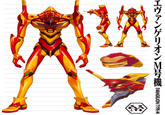Neon Genesis Evangelion
Part of a series on Gainax. [View Related Entries]
[View Related Sub-entries]
About
Neon Genesis Evangelion (Japanese: 新世紀エヴァンゲリオン, Shin Seiki Evangerion) is a Japanese mecha anime series created by Studio Gainax and directed by Hideaki Anno. Set in the post-apocalyptic near-future Tokyo, the main story revolves around a war between hostile beings known as "Angels" and the paramilitary organization NERV's giant humanoids "Evangelions," which are piloted by select teenagers, including the protagonist Shinji Ikari. Critically acclaimed as one of the most influential anime series made in the 1990s and an example of anime as an art form, the series has gained popularity in Japan, as well as a cult following in the United States and other Western countries. In 2019, the series was released on Netflix.
History
Animated by Tatsunoko Productions and Gainax, and co-produced by TV Tokyo and Nihon Ad Systems, Neon Genesis Evangelion ran as a 26-episode anime series from October 1995 to March 1996 on TV Tokyo. In the following years, the show became a huge success and a major turning point for the then-struggling Studio Gainax, leading onto the creation of two feature films, Neon Genesis Evangelion: Death & Rebirth and The End of Evangelion, both of which were released in 1997.
Though the show's creator departed from Studio Gainax some time after these films were made, he would later return with his new studio, Khara, to produce Rebuild of Evangelion, an alternate retelling of the series. The first three films of this tetralogy were released in 2007, 2009 and 2012, respectively, while the fourth film will be released in 2020 . The series also spawned a number of manga series, books, and video games based off the series.
Netflix Release
On November 26th, 2018, the Netflix YouTube channel released the official trailer for the upcoming release of the series Neon Genesis Evangelion on the video streaming platform (shown below). Within 24 hours, the video accumulated upwards of 219,000 views and 2,100 comments.
26 episodes of the show, along with the films The End of Evangelion and Evangelion: Death (True)2, are scheduled for release on Netflix in spring of 2019.
Plot
The story begins in 2000, when an alien life-form is discovered in Antarctica that is dubbed as an "Angel". Shortly after scientists inadvertently awaken the creature, it causes an environmental cataclysm known as the "Second Impact" that destroys most of Antarctica, radically alters the environment, and causes the deaths of over half of the human race. Over the course of the next fifteen years, Biomechs known as Evangelions (or EVAs) are produced to fight off subsequent Angels. In 2015, Shinji Ikari, the son of Gendo Ikari (the Machiavellian commander of the NERV organization and one of the survivors of the Second Impact), becomes the pilot of Evangelion Unit-01 in order to take on the rising threat of the Angel invasion. Shinji eventually teams up with fellow pilots Rei Ayanami and Asuka Langley Soryu.
Reception
On the review aggregator Rotten Tomatoes, the series has a 100% fresh rating (based on 26 critical reviews. The site's critical consensus reads, "Neon Genesis Evangelion, both a cultural touchstone for Japan and an uncompromising auteurist vision by creator Hideaki Anno, doubles as an enthralling apex for the mecha anime genre and as a harrowing exploration of depression -- making for a wholly singular epic about angels and inner demons."
Subtitle Issues
On June 21st, 2019, the series premiered on Netflix. That day, Twitter [16] user @jimmygnome9 tweeted a side-by-side comparison of a piece of a dialogue from the series. In the clip, lines of one character proclaiming their love for another were changed from "it means I love you" in the original release to "it means I like you" for Netflix. The tweet was captioned, "sorry but this is not ok (right is from the new netflix eva script)." The post received more than 25,000 likes and 11,000 retweets in less than one week (shown below).


Some fans disagreed with the change, accusing the Netflix translation of removing the queer subtext of the series. Twitter user @mioshuns tweeted,[17] "friendly reminder that not only did netflix take away the iconic song "fly me to the moon" from evangelion, they also censored the show's gay media! congrats netflix you managed to fuck up one of your biggest titles." The tweet received more than 18,000 likes and 7,500 retweets in less than one week (shown below, left).
Others claimed that it may the show "more exciting." Twitter[18] user @dankanemitsu wrote, "It is one thing for characters to confess their love. It is quite another for the audience to infer affection and leave them guessing. How committed are the characters? What possible misunderstandings might be talking place? Leaving room for interpretation make things exciting" (shown below, center).
Twitter[19] user @foreheadtouches claimed that this might actually be a more accurate translation. They wrote, "worth it to point out, Kaworu is actually saying 'そう、好意に値するよ' where 好意 is 'koui,' not 'koi' or 恋. 好意 can be translated to grace, BUT!! it would have been better to translate this as 'You are worthy of affection.'" The post received more than 1,500 likes and 250 retweets (shown below, right).



That day, Redditor [20] manoxMaster posted about the change in the /r/evangelion subreddit. The post received more than 2,200 points (97% upvoted) in less than one week.
You Are Worthy of My Grace
Following the post, Twitter[21] user @andreareventon tweeted, "Honestly, what we should do is just overuse this line in queer context to the point where it can't be detached from being understood as a direct explicit romance confession." The tweet received more than 20,000 likes and 7,000 retweets in one week (shown below).

Others responded to the tweet by using the line as the subtitle to various other images, particularly ones that feature a queer romance or have been inferred to imply one (examples below).
Mashable [22] published a report on the response to the subtitle change.



Fandom
Neon Genesis Evangelion has a considerably large online following, spawning a fansite, named Eva Monkey[1], as well as two wikis dedicated to the show[2][3]. As well as these, Evangelion also has a large following on Tumblr[4], DeviantArt[5], 4chan's /a/ anime and manga[6] and /m/ mecha[7] boards and Reddit[8]. Also, sites such as Anime News Network[9] and TV Tropes[10] offer a variety of information regarding the series. Fanfiction.net[11] also has over 7000 fanfiction stories in its archives. It also spawned multiple abridge and a popular one called Evabridge by a youtuber called Gigguk
Related Memes
A Cruel Angel's Thesis Parodies
A Cruel Angel's Thesis Parodies refer to a number of parodies revolving around the opening to the anime. The opening became popular in MADs, both on YouTube and Nico Nico Douga.
The Gendo Pose
The Gendo Pose refers to a series of photoshop parodies revolving aroung the character of Gendo Ikari. The pose is used to indicate a character's ability to scheme and be in complete control even in the most desperate of situations.

Gainax Ending/"Congratulations!"
Due to monetary constraints within Studio Gainax, the company was forced to recycle animation for non-action scenes more and more as the series came to a close. This eventually culminated in the infamous last two episodes, which completely abandoned the conspiracy that the show was building up to in order to focus on the lead cast coming to terms with their internal fears and anxieties. The final episode ends with Shinji Ikari learning to accept himself for who he is, while most of the characters in the show applaud and congratulate him for his newfound self-esteem.
Though Studio Gainax would eventually make a companion film to reveal what was occurring in the real world during the sequence portrayed in the last two episodes, the ending is still considered to be controversial and divisive among viewers. Shinji's English voice actor, Spike Spencer, would eventually lampoon the scene during the credits by alluding to the number of unresolved plot threads in the original series via an Easter Egg[12] in the DVD release of the series. The term "Gainax Ending"[13] was coined following the show's confusing conclusion to describe bizarre endings in later series made by the studio, as well as for other anime series.
Gendowned
Gendowned refers to a video series in which the character Gendo Ikari is show shooting someone (or something) down to AC/DC's "For Those About to Rock", followed by the word Gendowned, a portmanteau of "Gendo" and "Owned". The meme was first shown during the video "AMV Hell 2: Son of AMV Hell"[14].
Search Interest
External References
[2] Neon Genesis Evangelion Wikia
[4] Tumblr – Neon Genesis Evangelion
[5] DeviantArt – Neon Genesis Evangelion
[6] 4chan – /a/ Anime and Manga
[8] Reddit – Neon Genesis Evangelion
[9] Anime News Network – Neon Genesis Evangelion
[10] TV Tropes – Neon Genesis Evangelion
[11] Fanfiction.net – Neon Genesis Evangelion
[12] Shinji's "Is this how you end a series?" Rant
[13] TV Tropes – Gainax Ending
[14] Anime Music Videos – AMV Hell 2: Son of AMV Hell
[15] Rotten Tomatoes – Neon Genesis Evangelion
[16] Twitter – @jimmygnome9's Tweet
[17] Twitter – @mioshuns' Tweet
[18] Twitter – @dankanemitsu's Tweet
[19] Twitter – @foreheadtouches' Tweet
[20] Reddit – /r/evangelion
[21] Twitter – @andreareventon's Tweet
[22] Mashable – Fans say Netflix's dub of 'Neon Genesis Evangelion' erases queer subtext





















Top Comments
BearofCali
Nov 27, 2018 at 10:34PM EST
Tabris
Nov 27, 2018 at 08:40PM EST